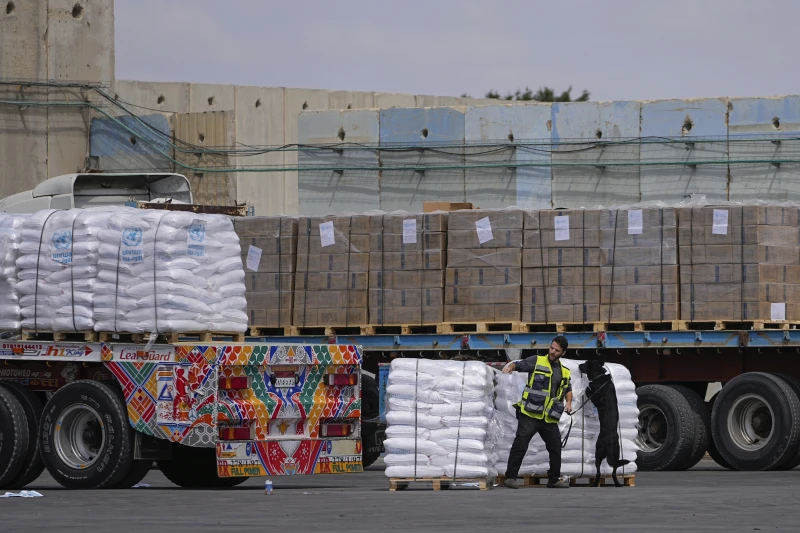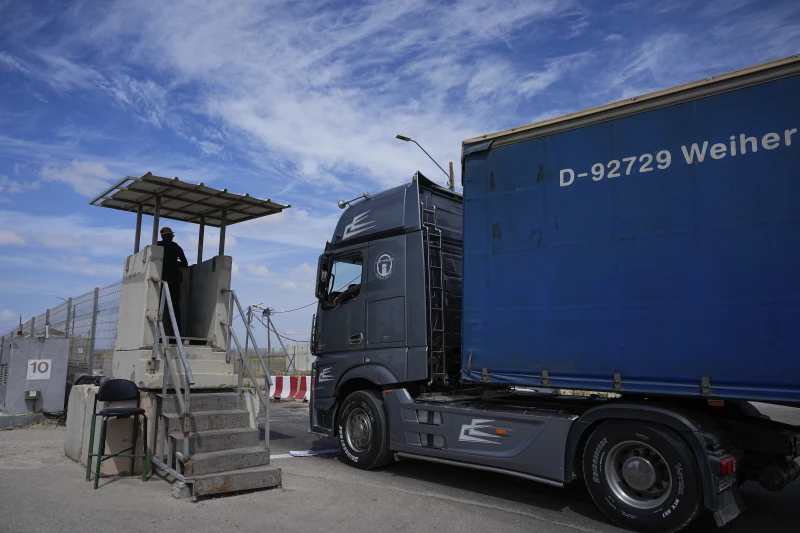In the midst of escalating tensions and humanitarian crises in the Gaza Strip, the world watches with bated breath as promises of increased aid from Israel remain unfulfilled.
The recent pledge by Israel to intensify aid to Gaza under heavy U.S. pressure has been met with skepticism as reports of widespread starvation in northern Gaza continue to emerge.
Despite assurances of ramped-up aid efforts, the reality on the ground paints a starkly different picture, leaving international officials and aid organizations deeply concerned about the deteriorating situation.
Samantha Power, the administrator of the U.S. Agency for International Development, has raised the alarm about the dire conditions in northern Gaza, acknowledging the credible reports of famine and calling on Israel to expedite the delivery of humanitarian assistance. Her sentiments echo those of U.S.
President Joe Biden, who expressed dissatisfaction with the current level of aid being provided by Israel, emphasizing that more needs to be done to avert a humanitarian catastrophe.
While Israel asserts that it has significantly increased the number of aid trucks entering Gaza, discrepancies in reporting have cast doubt on the actual impact of these efforts.
The conflicting accounts from Israeli authorities and U.N. workers highlight the challenges in accurately assessing the quantity and effectiveness of aid reaching the besieged enclave.
Despite Israel’s claims of transporting an average of 400 trucks per day into Gaza, on-the-ground observations suggest a more modest increase in aid deliveries, with significant shortfalls in reaching the most vulnerable populations in northern Gaza.
The promises made by Israeli Prime Minister Benjamin Netanyahu in response to mounting pressure from the U.S. signal a recognition of the need to address the humanitarian crisis in Gaza.
However, the gap between commitments and actions on the ground raises questions about the government’s ability to meet the urgent needs of the Palestinian population.
The tragic incident involving the killing of aid workers in an Israeli airstrike has underscored the critical importance of protecting civilians and humanitarian personnel in conflict zones, further emphasizing the need for swift and effective aid delivery mechanisms.
As the international community monitors the situation in Gaza with growing concern, the imperative of fulfilling aid commitments and ensuring unhindered access to humanitarian assistance becomes increasingly urgent.
The plight of the people in Gaza, especially those in the hardest-hit areas, demands immediate and concerted action to alleviate their suffering and prevent further deterioration of the humanitarian crisis.
The credibility of Israel’s promises hinges on its ability to translate rhetoric into tangible relief for the vulnerable populations in Gaza, underscoring the pressing need for transparent and accountable humanitarian interventions in the region.
The recent developments in the aid transfer operations to Gaza have raised significant concerns and highlighted the challenges faced in ensuring a smooth flow of essential supplies into the region.
Israeli officials have announced the abandonment of the plan to open the Erez crossing, opting instead to construct a new crossing, the opening date of which remains uncertain.
Additionally, the Ashdod port has yet to commence receiving aid shipments, and reports from Gaza aid groups indicate no notable increase in the number of trucks reaching their warehouses.
Prior to the latest Israel-Hamas conflict, approximately 500 trucks laden with food, fuel, and other necessities entered Gaza on a daily basis.
This supply was supplemented by local produce and fish cultivated within the territory. However, even this level of aid fell short in meeting the needs of a densely populated area that has endured the economic repercussions of a 17-year blockade imposed by Israel and Egypt.
The blockade, aimed at preventing Hamas from acquiring arms, severely restricted the flow of goods in and out of Gaza, exacerbating poverty and unemployment rates.
The discrepancy between the truck counts reported by Israel and the United Nations stems from differing methodologies in tallying incoming aid shipments.
Israel counts each truck it inspects and permits to enter Gaza, while the UNRWA only registers trucks returning from the designated pickup zone within Gaza.
Furthermore, variations in the loading capacity of trucks on the Gaza side of the crossing contribute to discrepancies in the reported numbers.
The process of transferring aid from Israeli inspection through the corridor and into Gaza faces several impediments, prolonging the delivery time.
Israel’s utilization of the Kerem Shalom crossing has been cited as a factor contributing to delays, with the crossing intermittently closed since the onset of the conflict.
Palestinian drivers are also required to wait for the unloading of incoming trucks, further constraining the pickup window.

Aid awaiting pickup may remain overnight after inspection, as operations halt at 4:30 p.m. for safety reasons, given the prevailing security concerns.
Moving forward, Israeli Defense Minister Yoav Gallant has underscored the prioritization of enhancing aid efforts, with a target of reaching 500 trucks per day.
However, challenges such as crossing closures, safety issues, and logistical constraints may persist, hindering the efficient distribution of aid.
The UN has advocated for a return to pre-war procedures, advocating for the opening of additional terminals and the facilitation of commercial goods alongside humanitarian aid to alleviate Gaza’s reliance on relief supplies and revive the local market.
In conclusion, the complexities surrounding aid transfer operations to Gaza underscore the urgent need for coordinated efforts to streamline the process and address the humanitarian crisis in the region.
Collaborative initiatives between Israel, the UN, and aid organizations are essential to overcome logistical challenges and ensure the timely and effective delivery of essential supplies to the people of Gaza.
